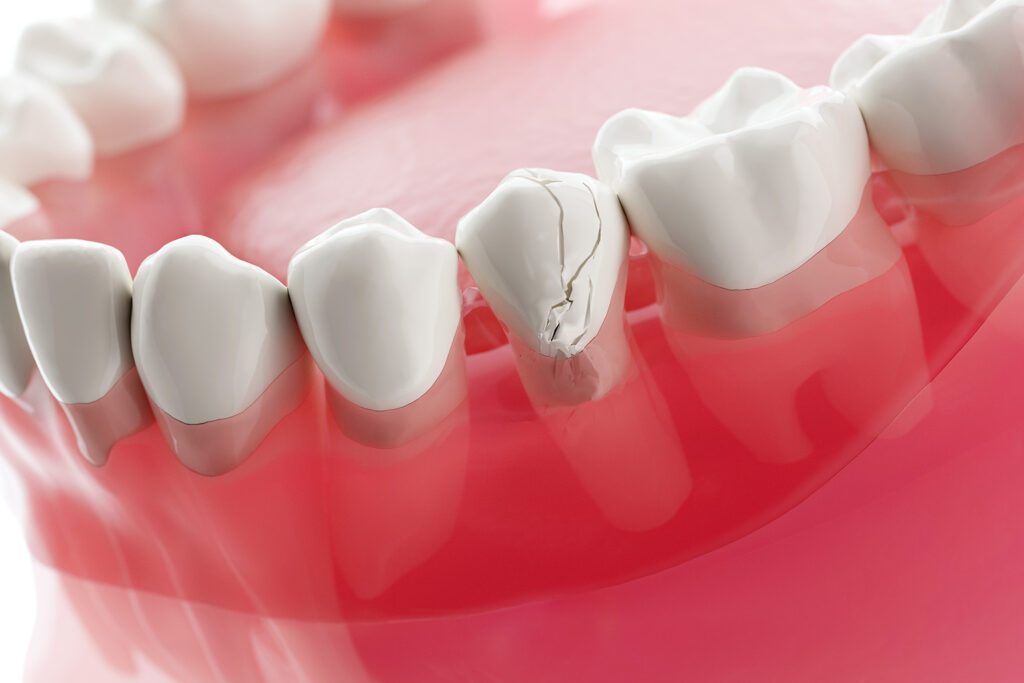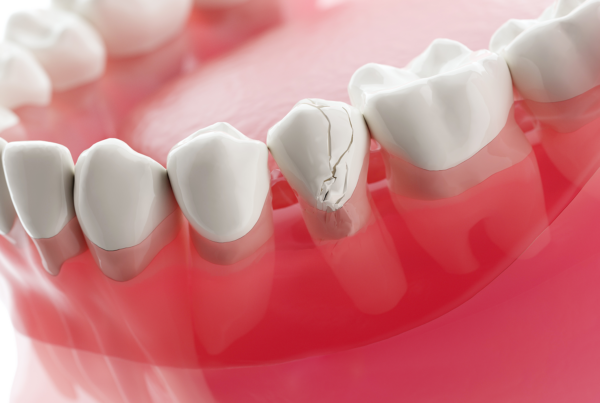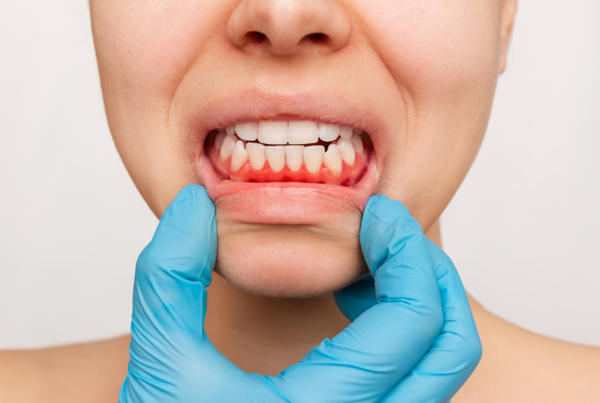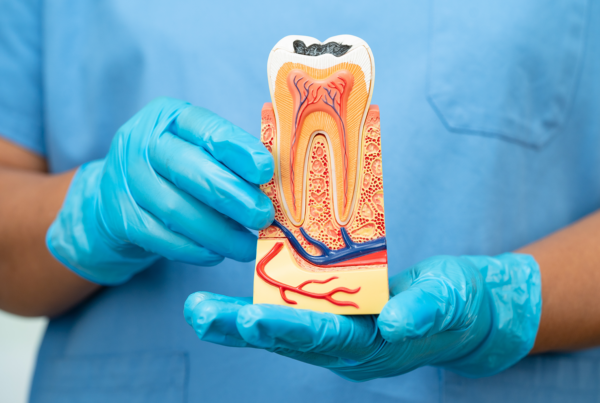A smile can light up a room, boost your confidence, and create a positive impact on the people around you. However, when you have a chipped or cracked tooth, it’s natural to feel self-conscious about your smile. In this blog post, we’ll cover the basics of chipped and cracked teeth and provide tips on what to do if you find yourself facing this dental dilemma.

Is a Cracked Tooth an Emergency?
A cracked tooth can range from a minor cosmetic issue to a serious dental emergency. The severity of the crack will determine the urgency of the situation. Hairline cracks and minor chips usually don’t require immediate attention, but they should still be evaluated by a dentist as soon as possible to prevent further damage.
However, if you’re experiencing severe pain, sensitivity, or if the crack has exposed the inner layers of the tooth, it’s considered a dental emergency. In these cases, you should contact your dentist right away to receive prompt treatment and minimize the risk of infection, tooth loss, or other complications.
What Do You Do If You Chipped Your Tooth?
If you’ve chipped your tooth, don’t panic! The following steps can help you manage the situation until you can see your dentist:
- Rinse your mouth: Gently rinse your mouth with warm water to remove any debris and reduce the risk of infection.
- Apply pressure if there’s bleeding: If the chipped area is bleeding, apply gentle pressure using a clean gauze or cloth to stop the bleeding.
- Use a cold compress: Apply a cold compress or ice pack to your cheek near the chipped tooth to reduce swelling and numb the area.
- Avoid hard foods: Stick to soft foods and avoid biting down on the affected tooth to prevent further damage.
- Over-the-counter pain relief: If you’re experiencing pain, consider taking an over-the-counter pain reliever like ibuprofen or acetaminophen to help alleviate discomfort.
- See your dentist as soon as possible: Even if the chip seems minor, it’s important to have a dental professional assess the damage and recommend appropriate treatment.
Can A Cracked Tooth Heal On Its Own?
While our bodies have the amazing ability to heal themselves, a cracked tooth is, unfortunately, an exception to this rule. Once a tooth is damaged, it cannot repair itself, making it essential to seek professional dental care. Prompt treatment can prevent further damage, alleviate pain, and restore the function and appearance of your tooth.
Treatment Options for Chipped and Cracked Teeth
The treatment for a chipped or cracked tooth depends on the severity of the damage and the overall health of your tooth. Your dentist will assess the situation and recommend the best course of action. Here are some common treatment options:
- Dental bonding: For minor chips and cracks, your dentist may use a tooth-colored resin to fill in the damaged area and restore the appearance of your tooth.
- Dental veneers: If the chip or crack affects the front of your tooth, a dental veneer can provide a natural-looking, long-lasting solution.
- Dental crowns: For more extensive damage, a dental crown may be necessary to protect the remaining tooth structure and restore its function.
- Root canal treatment: If the crack extends into the pulp of your tooth, a root canal treatment may be required to remove the damaged tissue and prevent infection.
- Tooth extraction: In some cases, the damage may be too severe to save the tooth, and extraction may be the only option. Your dentist will discuss tooth replacement options such as dental implants, bridges, or partial dentures to restore your smile and prevent issues related to tooth loss.
Preventing Chipped and Cracked Teeth
While accidents can happen, there are several proactive steps you can take to minimize the risk of chipping or cracking a tooth. By adopting these habits, you can better protect your teeth and maintain a healthy, confident smile.
- Avoid hard foods: Chewing on hard candies, ice, or other hard foods can put excessive pressure on your teeth and lead to cracks or chips. Instead, opt for softer foods or cut them into smaller, more manageable pieces. When consuming nuts or popcorn, be cautious of any hard, unpopped kernels that could cause damage.
- Don’t use your teeth as tools: It may be tempting to use your teeth to open packages, cut tape, or hold items, but doing so can weaken them and cause damage. Instead, keep a pair of scissors or pliers handy for these tasks and save your teeth for their intended purpose – chewing and enjoying your food.
- Wear a mouthguard: If you participate in contact sports, recreational activities with potential impact, or grind your teeth at night (a condition called bruxism), wearing a custom-fit mouthguard can provide crucial protection against chips and cracks. Speak with your dentist about getting a custom mouthguard designed specifically for your needs, as it will offer the most effective protection.
- Maintain good oral hygiene: Regular brushing, flossing, and dental checkups can help keep your teeth strong and healthy, reducing the likelihood of damage. Use a soft-bristle toothbrush, fluoride toothpaste, and floss daily to remove plaque and bacteria that can weaken your teeth. Visit your dentist at least twice a year for professional cleanings and checkups to catch and address any potential issues early.
- Be mindful of teeth grinding and clenching: If you tend to clench or grind your teeth during the day, make a conscious effort to relax your jaw muscles. Practicing relaxation techniques, like deep breathing or meditation, can help reduce stress, which often contributes to teeth grinding and clenching.
- Strengthen your teeth with a balanced diet: A diet rich in vitamins and minerals, particularly calcium and vitamin D, can help strengthen your teeth and reduce the risk of damage. Incorporate foods like dairy products, leafy greens, and fatty fish into your meals to promote strong, healthy teeth.
Conclusion
Chipped and cracked teeth can be a source of discomfort and self-consciousness, but they don’t have to steal your smile. By following the tips above, you can handle dental emergencies calmly and effectively while minimizing the risk of complications. Remember, even minor chips and cracks should be assessed by a dental professional to ensure the best possible outcome.
At Encino Dental Studio, our team of experienced and compassionate dentists is here to help you restore your smile and maintain optimal oral health. If you suspect you have a chipped or cracked tooth, don’t hesitate to schedule a consultation. We’ll assess the situation, discuss your treatment options, and provide personalized care to get you back to smiling confidently in no time.








